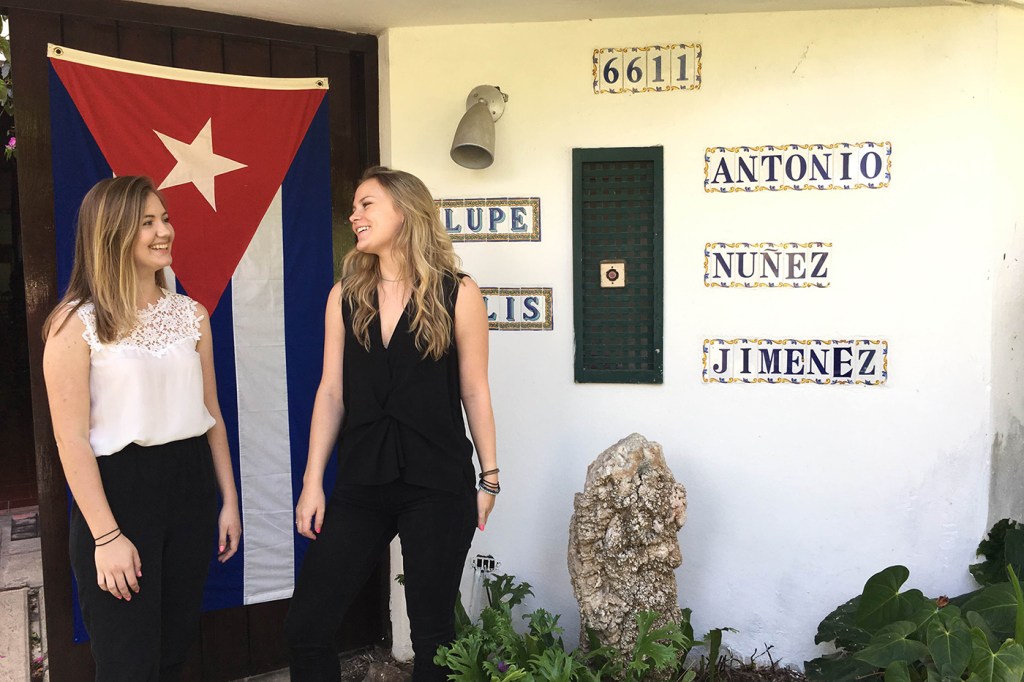Northeastern students make history with Cuba co-ops

Caroline Bynum and Madeline Drake made higher education history last week, according to Northeastern University professor Jose Buscaglia, becoming the first two students in the world to do co-op in Cuba.
“I feel very fortunate to have the opportunity to live and work in a country I never thought I’d be able to explore,” said Bynum, a third-year human services major. Drake, a fourth-year international affairs major, agreed, noting, “This is an incredible honor, a unique opportunity, and a great chance to learn.”
Bynum and Drake will spend the next four months working for the Antonio Núñez Jiménez Foundation, a non-governmental organization named in honor of the late Cuban archaeologist and geographer. FANJ is primarily dedicated to studying the impacts of climate change on Cuba and promoting the environmental-consciousness of the country’s people, but it also runs a cultural services program aimed at preserving a diverse range of artifacts and spreading the work of renowned Cuban intellectuals.
Bynum and Drake have begun working on a cultural preservation project in celebration of the 30-year anniversary of Jimenez’ famous canoeing expedition through 20 Latin American and Caribbean countries. The young global citizens will work to digitize and catalogue artifacts that he and his crew of 300 researchers collected on their yearlong journey, a 10,000-mile voyage that ended in 1988 in San Salvador, Bahamas.
“Our goal is to preserve Cuba’s unique culture, even as more and more Americans are being permitted to enter the country,” said Drake, who, like Bynum, received a Presidential Global Scholarship to participate in this experiential learning opportunity. “Hopefully, our work will align with the foundation’s mission to promote sustainable development.”
The partnership
More than two years ago, then President Barack Obama announced plans to “normalize relations” between the U.S. and Cuban governments, effectively lifting a half-century trade embargo that the U.S. imposed on the island nation in 1963.
It was this move to restore diplomatic relations between the two countries that paved the way for Northeastern to form academic partnerships with two Cuban institutions— FANJ and the University of Havana.
Under the memorandum of understanding signed with Northeastern in the spring of 2016, FANJ agreed to accept co-op students and work with university faculty to establish joint marine science, environmental sustainability, and social science-related research projects. In a second agreement signed with the University of Havana, Northeastern students will begin an Experiential Year Abroad program in September 2017, spending the first semester studying in Havana and the second on co-ops at Cuban newspapers, magazines, and government agencies.
“We are not going there to discover Cuba,” said Buscaglia, a Caribbean scholar and chair of Northeastern’s Department of Cultures, Societies and Global Studies who co-led the university’s Cuba delegation. “We are going to work with the people who have been there forever and are concerned about preserving their environment.”
A global perspective
As scholars with a passion for exploring the world and effecting positive change, Bynum and Drake are the perfect fit for FANJ.
I feel very fortunate to have the opportunity to live and work in a country I never thought I’d be able to explore.
Caroline Bynum SSH’21
Bynum grew up on a farm outside of Durham, North Carolina, and spent a year of her childhood living in Mexico, where she discovered her passion for the Spanish language.
She said her co-op at Beyond Conflict, a peace building nonprofit based in Boston, instilled in her an appreciation of challenges facing those who are working to foster political change. And she noted that her Dialogue of Civilizations program in Germany, which focused on genocide and the Holocaust, prepared her to confront any number of heavy issues in a thoughtful and compassionate manner. It’s a soft skill that’s likely to come in handy in Cuba, as she navigates thorny topics like environmental responsibility and social engagement.
“It’s very important to listen, to be observant, and to refrain from jumping to any conclusions when you experience a new culture for the first time,” said Bynum, whose Northeastern courses in Latin American film helped to hone her interest in the region. “I’m looking forward to building relationships with people and immersing myself in the Cuban culture.”
She envisions the Cuba co-op as a stepping-stone along a path toward a career in social justice. “I don’t know exactly what I want to do,” she said, “but I do know that I want to help other people solve complicated problems.”
Drake recently completed a co-op as a program director for Manna Project International, a community building nonprofit based in Nicaragua. There she oversaw initiatives ranging from a women’s empowerment program to a health class for girls, responsibilities that often afforded her the opportunity to build strong relationships with local community members.
“My goal was to get to know people who were nothing like me,” said Drake, who’s also taught Spanish language classes to first-graders in Mexico City and studied Spanish culture on a Dialogue of Civilizations program. “It pushed me out of my comfort zone, which will help me in Cuba as I immerse myself in their traditions.”
She foresees herself as a Foreign Service officer, a career diplomat living abroad. “Hopefully this co-op will accustom me to living in new places and interacting with different people,” she said. “I’m excited and looking forward to keeping an open mind.”





